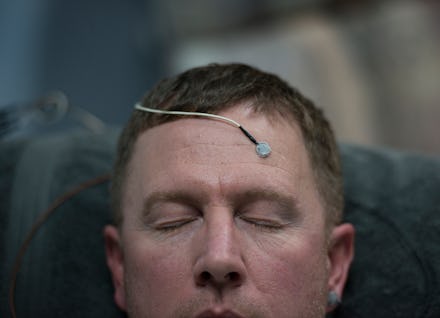Research Shows Mental Health Issues More Common in Veterans Than Rest of US Population

Veterans returning to civilian life after serving in the U.S. military are subjected to competitive disadvantages not just in the American workplace, but in our health care industry as well. Reports indicate the Veterans Administration is severely backlogged with delays in care, causing the unnecessary deaths of former military personnel throughout the nation.
What's worse is we're beginning to learn the front line is a catalyst for much more than physical wounds — the rate of mental disorder in soldiers could be five times higher than that of typical civilians, according to a Harvard University study published in JAMA Psychiatry.
Read more: Bernie Sanders Got Slammed by Twitter for His Mental Health Comment at Sunday's Debate
It's the largest mental health study in conjunction with the U.S. military, with nearly 25% of active-duty, non-deployed soldiers testing positive for some form of mental illness, according to CNN. Of that group, 11% had more than one disorder. Only half of those originally had mental health disorder diagnoses upon enlisting into the Army.
It becomes alarmingly clear just how prevalent mental health issues are in the U.S. military when analyzing the data:
- Post-traumatic stress disorder is almost 15 times higher in veterans than civilians.
- Rate of depression amongst soldiers is five times higher than that of civilians.
- Intermittent explosive disorder is six times more likely found in veterans.
"Every day of my life for eight years I had an undesirable will to shoot myself. Every single day. And I just didn't know why," Alex Kasmarek, an Army veteran who toured in Iraq during an eight-month rotation, told Australia's ABC News. Upon returning home with a mental illness, Kasmarek withdrew from the military, became homeless and was consistently contemplating suicide.
"When it came to suicidal thoughts, one study found about 14% of soldiers had thought about taking their lives, while 5.3% had planned a suicide and 2.4% had actually made one or more attempts," CNN reported. "Most suicides occurred back home, not in Afghanistan or Iraq, and the rate has increased among troops who have never been deployed overseas."
The extreme delay in services provided to former member of the military has not only caused rescheduled visits, but a number of needless deaths as well. The consistent delays in health care could pose drastic implications for veterans seeking mental health treatment, often and already underreported and misdiagnosed field.
The fact that mental health illnesses are much more likely in veterans who rely on such services only makes matters so much worse.